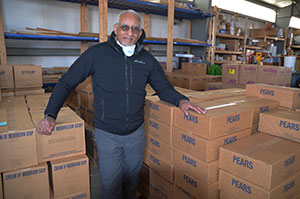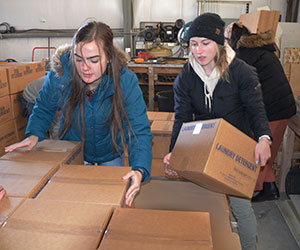
Building on a formal apology and other actions in 2019 to honor the Black 14 on the 50th anniversary of their dismissal from the University of Wyoming's football team, UW and the former student-athletes are moving forward with additional steps to ensure that the lessons of one of the most turbulent times in the university's history aren't forgotten.
Working with the Black 14, UW will hold its inaugural Black 14 Social Justice Summer Institute in July 2022 to help in the recruitment and success of Black students at UW. An exhibition about the Black 14 is being developed for display this coming summer at the UW Art Museum. And the Black 14's contributions to UW, working in collaboration with the Church of Jesus Christ of Latter-day Saints, now include a second year of food distribution to UW's Food Share Pantry for students in need.
"I wasn't yet UW's president when the 50th anniversary commemoration was held and our apology was issued, but I stand strongly behind the acknowledgment that these men were treated unfairly by the university and suffered hardships because of that treatment," UW President Ed Seidel says. "What's remarkable is that so much good is now coming from the relationships made possible through earnest efforts at reconciliation and healing. I'm delighted that our collaborations with the Black 14 and other parties are continuing and growing -- for recognition, remembrance and education of future generations."
The Wyoming football program had become nationally recognized during the 1960s, going 10-1 with a win in the Sun Bowl in 1966 and finishing the season with a No. 6 ranking in the final Associated Press poll in 1967. With an experienced team in 1969, the Cowboys appeared to be a lock to dominate the Western Athletic Conference once again, setting their sights on even more national recognition.
But, the 14 UW players were dismissed from the team by head football Coach Lloyd Eaton for wanting to ask for permission to protest the Church of Jesus Christ of Latter-day Saints' policy of prohibiting Black persons from attaining the priesthood (the church changed its policy in 1978). The UW players wanted to wear black armbands during the game against the church's Brigham Young University.
UW's 2019 apology letter to the Black 14, which may be viewed here, notes that the football players were deprived of the college experience they deserved.
"Not to be heard, to be shunned, and to have your collegiate careers derailed as both students and athletes is a tragedy," the letter says. "Unfortunately, it continued beyond your time here …
"We applaud you, but most importantly, respect you for rising above that difficult time to build productive lives. You remained faithful to your convictions as you moved forward, all the while continuing to tell the compelling story of the Black 14," the letter continues. "As you told that story, it would have been easy to attack the university that turned its back on you. But you demonstrated immense character and integrity in avoiding that path. Your actions then, and throughout these 50 years have definitely made a difference, not only on this campus, but throughout our country."
UW Athletics Director Tom Burman delivered the apology letter to surviving members of the Black 14 at a dinner that was part of a weeklong series of 50th anniversary activities in September 2019 on the UW campus. Additionally, a public panel discussion and open house were held; the Black 14 survivors met with various students groups and classes; a plaque telling the story of the Black 14 was unveiled on the southeast side of War Memorial Stadium; the Black 14 spoke to UW's football team during pregame preparations; and they were recognized at halftime of the UW-University of Idaho football game, where they were given UW letter jackets.

"Please accept this sincere apology from the University of Wyoming for the unfair way you were treated, and for the hardships that treatment created for you," UW's letter concludes. "We want to welcome you home as valued members of this institution, and hope you accept our old Wyoming saying, 'Once a Cowboy, always a Cowboy.'"
Since that time, UW's Office of Diversity, Equity and Inclusion, along with other units of the university, has been working to develop the Black 14 Social Justice Summer Institute, a multiday, overnight program to provide high school students with the opportunity to research contemporary issues related to and important to the Black community at the local, state, national and worldwide levels. At the same time, the institute is intended to be a pipeline program for Black students to attend UW and have a positive impact on the college completion rate of Black students.
"The Black 14 Social Justice Summer Institute will use the history of the Black 14 as an entry point for students to learn about social justice, resistance to social injustice and oppression," says Emily Monago, who founded the institute when she was UW's chief diversity officer before recently taking a position with the Georgia Tech Research Institute. "Students' knowledge of social justice, leadership, teamwork and communication skills that facilitate positive change will be enhanced while exposing them to the experiences of living, researching and studying at UW."






